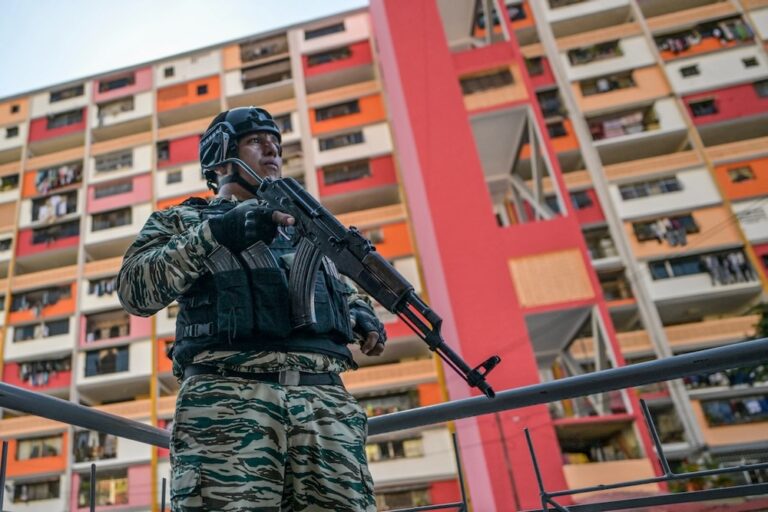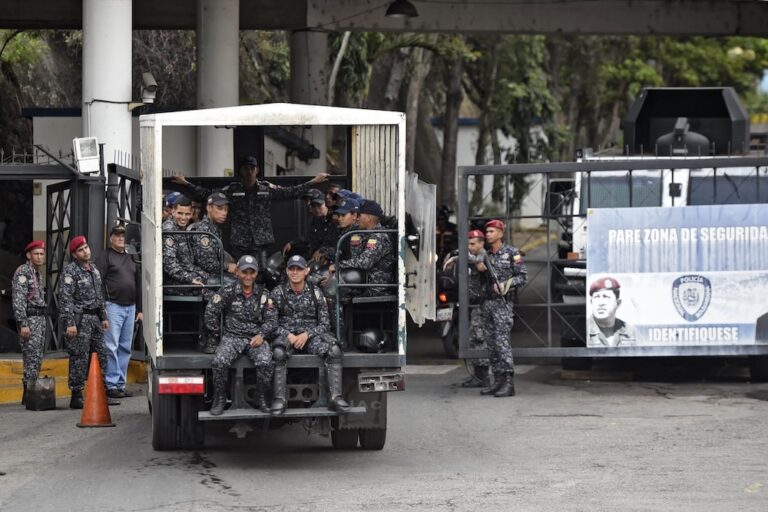Since April 30, journalists have been affected by tear gas when covering the protests; detention and prosecution at the hands of state security authorities is also a serious risk.
This statement was originally published on cpj.org on 2 May 2019.
The long-running political crisis in Venezuela escalated on April 30, 2019, after a civilian and military uprising was thwarted by the government of Nicolás Maduro, according to news reports. Opposition leaders Juan Guaidó and Leopoldo Lopez, accompanied by members of the armed forces, congregated on a highway in eastern Caracas and called upon the armed forces and their supporters to oust the government, according to those reports.
Street battles with pro-Maduro security forces ensued, with government forces using tear gas, water cannons, armored military vehicles, and live ammunition to disperse opposition activists, as seen in video footage recorded by Reuters. The opposition has called on public workers to join the demonstrations and weaken the regime through a series of coordinated strikes beginning on May 2, news reports said.
For local journalists, the main risk is the potential for physical harm while covering protests. Since April 30, journalists have been affected by tear gas when covering the protests, according to news reports.
Detention and prosecution at the hands of state security authorities is also a serious risk. A group of journalists was detained in the Caracas Airport on May 2, according to a tweet from local news outlet CaraotaDigital.
A foreign reporter who was recently detained by intelligence authorities told CPJ that the agents were primarily interested in identifying his local contacts. Agents went through his WhatsApp conversations, and unsuccessfully attempted to set up a meeting with the reporter’s local assistants, the reporter said.
CNN reported that it was taken off the air moments after it broadcast a video that showed an armored military vehicle purposely running over pro-opposition protesters in Caracas; CNN reported that the BBC was taken off the air as well. NetBlocks, a digital rights organization, has reported that internet disruptions intermittently restricted access to Twitter, Facebook, and Periscope. WhatsApp servers are unstable and Telegram is now unusable in the country, NetBlocks reported.
Since 2014, Venezuelan internet providers have hindered access to news sites and other websites, as reported by NBC. CPJ encourages the use of virtual private networks (VPNs) to evade such internet censorship.
CPJ has put out the following advice for local and foreign journalists working in Venezuela, or planning to travel there.
Visas
For foreign journalists planning on entering the country, it is difficult to get work visas or accreditation, CPJ has documented. However, entering on tourist visas can be problematic. Immigration officials are on high alert and the few planes entering the country are virtually empty. The limited flight options in and out of the country, may make an evacuation difficult. It is advisable that journalists planning to go to Venezuela contact their insurance company prior to travel to check that evacuation is still viable.
Foreign journalists planning to enter Venezuela should apply for a visa by downloading and filling out the form available at this link and communicating directly with the Venezuelan consulate in their home countries to get the correct information about required documentation, including a letter from their employer. It is not recommended that journalists try to enter the country without media credentials. In late January, Venezuelan authorities detained and deported multiple reporting teams, including two Chilean journalists and two French TV reporters, and accused them of lacking proper accreditation, according to news reports. Three reporters with Spanish news agency EFE were detained on January 30 and held overnight, but were then allowed to remain in the country once authorities determined they had the required visas, according to EFE. Reporters in Caracas should be especially cautious when reporting near the Miraflores presidential palace, where state security forces have detained several journalists, according to alerts posted on Twitter by the National Union of Press Workers.
[If you have trouble downloading or accessing the form required to apply for a journalist visa, or if you have been denied a visa to enter Venezuela as a journalist, please contact CPJ at emergencies@cpj.org.]
If successful in entering the country on tourist visas, journalists are at risk of detention and expulsion. Locals assisting them may be incarcerated indefinitely.
Airports and Arrivals
Only two airlines, COPA and Dominicana, are currently flying in and out of the Simon Bolivar Caracas International Airport, journalists in Venezuela told CPJ. There are no flights between the United States and Venezuela following a U.S. Federal Aviation Administration ban on low-flying flights (below 26,000 feet) over Venezuelan airspace until further notice. Some local flights have also been suspended, according to local reports.
CPJ is aware of some journalists who have successfully entered Venezuela via the Simon Bolivar Caracas International Airport since April 30.



